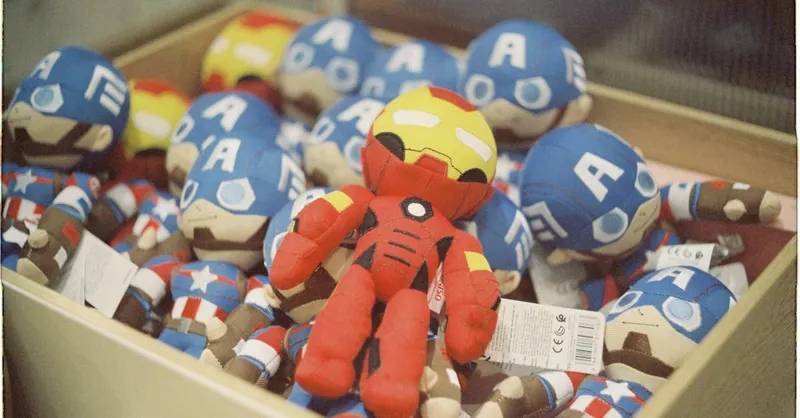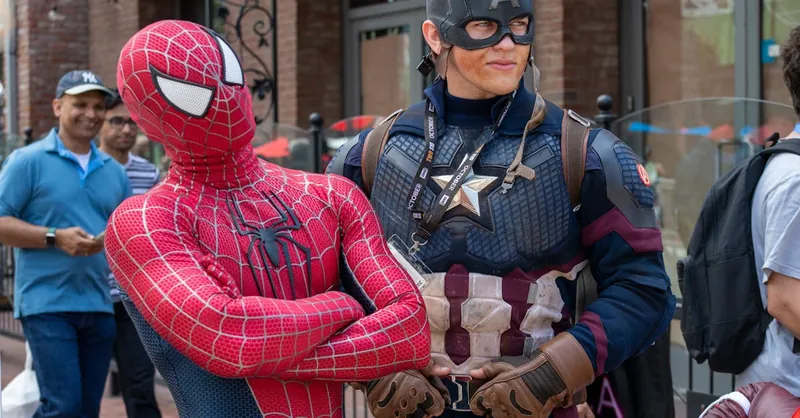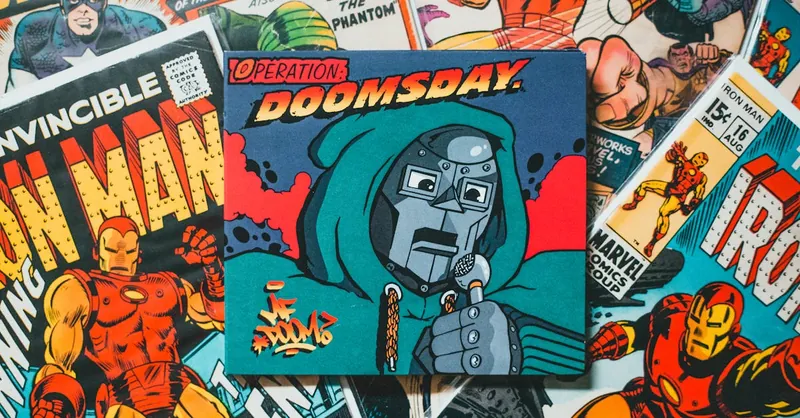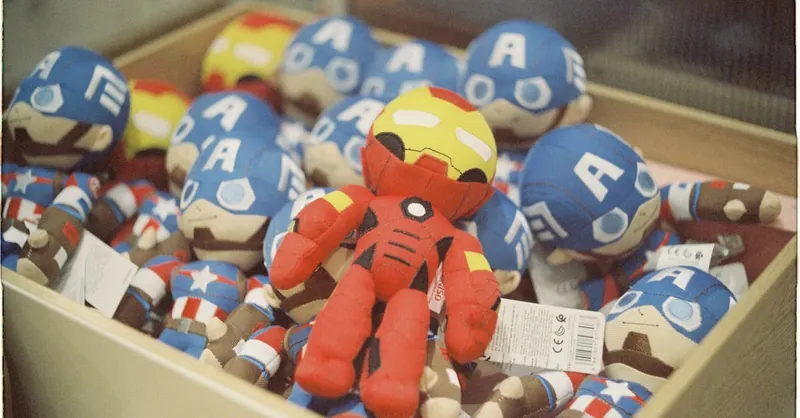Marvel Superheroes Without Comics Knowledge: Easy Story Guide
Category: Marvel
Discover Marvel Superheroes Without Comics Confusion
If you're a casual Marvel fan or a newcomer eager to dive into the world of Marvel superheroes but find comics overwhelming or confusing, you're in the right place. Many people enjoy Marvel movies and shows but feel lost when trying to understand the characters' backgrounds or story arcs because they don't follow the comics. This post is crafted especially for you — to break down Marvel heroes into simple, standalone narratives without assuming any prior comics knowledge. You'll get clear, bite-sized insights into who these superheroes are, what motivates them, and their key stories that you need to know, making it easier to enjoy their cinematic adventures and beyond. By the end, you will not only recognize your favorite heroes better but also appreciate their unique journeys without the dense comic book history. Whether you're tuning in to the MCU for the first time or looking to explain Marvel to friends without comics baggage, this guide gives you a straightforward, approachable entry point into Marvel’s rich storytelling universe.
- Discover Marvel Superheroes Without Comics Confusion
- Introduction to Marvel Superheroes: What Defines a Marvel Superhero and Why Their Stories Resonate Beyond Comics
- Understanding the Marvel Cinematic Universe (MCU) for Newcomers: Key Films and Shows That Build the Marvel World Accessible to Everyone
- Standalone Character Profiles: Simplified Origins and Motivations of Popular Marvel Superheroes
- Key Marvel Story Arcs Simplified: Breaking Down Major Plotlines from Movies and TV Shows
- How Marvel Characters Grow and Relate: Exploring Character Development and Relationships Made Simple
- Recognizing Marvel’s Themes: Heroism, Responsibility, Diversity, and Teamwork Explained Simply
- Essential Marvel Villain Overviews: Understanding Iconic Antagonists Without Comic Complexities
- Tips for Watching Marvel Content Without Confusion: Viewing Order, Recommended Titles, and Avoiding Spoilers
- Marvel Beyond the Screen: How to Engage with Marvel Characters Through Video Games, Novels, and Merchandise Without Diving into Comics
- Frequently Asked Questions About Marvel Superheroes and Stories Answered Simply
- 1. Do I Need to Read Marvel Comics to Understand the Movies and Shows?
- 2. Why Do Some Characters Have Multiple Versions or Stories?
- 3. What Is the Best Way to Follow the Marvel Story Without Getting Lost?
- 4. How Are Marvel Heroes Different from Each Other?
- 5. Can I Enjoy Marvel Without Watching Every Movie or Show?
- 6. Who Are the Important Supporting Characters to Know?
- 7. What Are the Core Themes That Keep Marvel Stories Connected?
Introduction to Marvel Superheroes: What Defines a Marvel Superhero and Why Their Stories Resonate Beyond Comics
At their core, Marvel superheroes are more than just characters with extraordinary powers or advanced technology—they are symbols of resilience, morality, and personal growth. What sets Marvel heroes apart is their deep humanity; they face relatable struggles such as identity, responsibility, and loss, which makes their stories resonate with audiences well beyond comic book readers. Even if you’ve never picked up a Marvel comic, you’ve likely connected with the themes of heroism, sacrifice, and self-discovery that these characters embody in movies and TV shows.
Marvel superheroes are often defined by three key elements:
- Unique Origins or Abilities: Whether it’s Peter Parker gaining spider-like powers through a bite or Tony Stark building an armored suit, each hero has a distinctive beginning that explains their powers or skills.
- Personal Challenges and Growth: Unlike perfect superheroes, Marvel characters often wrestle with their flaws, making them relatable. For example, Spider-Man balances his teenage life with crime-fighting responsibilities.
- Moral Dilemmas and Heroic Choices: Their stories frequently explore complex ethical questions—like when to use power, how to protect loved ones, or what it truly means to be a hero.
These elements combine to create multidimensional heroes whose stories inspire viewers across generations and mediums. Even without comic continuity, their journeys are universally compelling because they reflect real human challenges wrapped in thrilling action and adventure. This is why Marvel superheroes have become cultural icons who matter just as much on screen as they do on the page.
Image courtesy of Erik Mclean
Understanding the Marvel Cinematic Universe (MCU) for Newcomers: Key Films and Shows That Build the Marvel World Accessible to Everyone
The Marvel Cinematic Universe (MCU) is the best starting point for anyone new to Marvel superheroes because it presents their stories through popular, easy-to-follow movies and TV shows. Unlike comics, which can span decades and countless storylines, the MCU builds a cohesive, connected world where characters and events unfold in a clear, chronological order. It’s designed to welcome casual fans by introducing heroes one step at a time and blending action, humor, and emotional depth.
For newcomers, focusing on a handful of key MCU films and series will provide a solid understanding of the Marvel universe without being overwhelmed. Here are the essential entries that shape the Marvel world and its major characters in simple, standalone narratives:
- Iron Man (2008) – Often called the genesis of the MCU, this film introduces Tony Stark, a billionaire inventor whose transformation into Iron Man sets the tone for modern superhero stories.
- Captain America: The First Avenger (2011) – Learn about Steve Rogers’ journey from an underdog soldier to the iconic Captain America, highlighting heroism and sacrifice during World War II.
- The Avengers (2012) – This film brings together major heroes like Iron Man, Captain America, Thor, Hulk, Black Widow, and Hawkeye, showing how teamwork forms the foundation of Marvel’s shared universe.
- Guardians of the Galaxy (2014) – Offering a cosmic adventure full of humor and heart, this movie introduces new heroes from outer space and expands Marvel beyond Earth-bound stories.
- Black Panther (2018) – A culturally significant entry that explores themes of legacy, leadership, and identity through the superhero T’Challa and the advanced nation of Wakanda.
- Spider-Man: Homecoming (2017) – Focusing on a young Peter Parker balancing high school and heroics, this film adds a relatable coming-of-age angle within the larger MCU.
- WandaVision (2021) and Loki (2021) – These hit Disney+ shows deepen character development and explore new timelines, important for understanding the evolving MCU landscape.
By starting with these key titles, newcomers can easily grasp each hero’s story and how they connect to a larger narrative called the “Infinity Saga” and beyond. This curated viewing approach removes the need for prior comic knowledge while still delivering entertaining and meaningful superhero tales. Whether you’re watching for the first time or explaining Marvel to friends, this accessible list helps build a clear picture of the Marvel world’s rich and exciting storytelling universe.

Image courtesy of Cien Nguyen
Standalone Character Profiles: Simplified Origins and Motivations of Popular Marvel Superheroes
To truly appreciate Marvel superheroes without getting tangled in comic book lore, it helps to know their core origin stories and what drives them as heroes. Below is a straightforward breakdown of five of the most iconic Marvel heroes—Iron Man, Spider-Man, Captain America, Black Panther, and Captain Marvel—explaining their backgrounds and motivations in plain terms.
1. Iron Man (Tony Stark)
Origin: A genius inventor and billionaire industrialist, Tony Stark is kidnapped and gravely injured by enemies. Using his intelligence, he builds a powerful armored suit to escape captivity and later refines it to fight crime.
Motivation: Tony shifts from being a self-centered weapons manufacturer to a hero committed to protecting the world from threats, driven by guilt for his past mistakes and a desire to use his talents for good.
2. Spider-Man (Peter Parker)
Origin: A high school student bitten by a radioactive spider gains spider-like abilities, including super strength and the ability to cling to walls. After the tragic loss of his Uncle Ben, Peter learns that "with great power comes great responsibility."
Motivation: Spider-Man fights crime not just to stop villains, but to honor the lessons of responsibility and sacrifice taught by his family’s tragedy, while juggling everyday teen challenges.
3. Captain America (Steve Rogers)
Origin: A frail but determined young man during World War II volunteers for an experimental serum that transforms him into the super-soldier Captain America, embodying courage and justice.
Motivation: Steve represents unwavering patriotism and idealism, always striving to do what’s right even when it’s difficult, symbolizing hope and resilience in the face of adversity.
4. Black Panther (T’Challa)
Origin: The king of the hidden African nation Wakanda, T’Challa inherits the mantle of Black Panther and the powers bestowed by a sacred heart-shaped herb. He combines royalty, tradition, and advanced technology.
Motivation: T’Challa protects his people and the world while grappling with leadership responsibilities and the legacy of his ancestors, striving for justice and balance between cultural heritage and modernization.
5. Captain Marvel (Carol Danvers)
Origin: Former Air Force pilot Carol Danvers gains cosmic powers after exposure to alien technology in a life-threatening accident, transforming her into one of the universe’s most powerful heroes.
Motivation: Carol fights to protect Earth and the galaxy from extraterrestrial threats, driven by resilience, a strong moral compass, and a quest for identity amid cosmic conflicts.
Each of these heroes’ simplified stories capture the essence of their unique powers, personal growth, and heroic goals, making it easier for casual fans to understand what makes them special. Their motivations go beyond flashy powers—they highlight relatable human emotions and choices, enabling viewers and newcomers to connect deeply with their journeys without needing years of comic book reading.
Image courtesy of Heriberto Jahir Medina
Key Marvel Story Arcs Simplified: Breaking Down Major Plotlines from Movies and TV Shows
One of the best ways to enjoy Marvel superheroes without getting lost in decades of comic book history is to understand the major story arcs depicted in the movies and TV shows. These narratives are crafted to be thrilling yet accessible, focusing on key themes and character developments that define the Marvel universe in straightforward, standalone ways.
Here’s a simplified breakdown of some of the most important Marvel storylines across the MCU and related shows, perfect for casual fans and newcomers:
- The Infinity Saga
- Spanning multiple phases of the MCU, this epic storyline revolves around the search for the six powerful Infinity Stones, which the villain Thanos seeks to collect in order to erase half of all life in the universe.
- Central to this arc are themes of sacrifice, teamwork, and destiny as heroes including Iron Man, Captain America, Thor, and the Guardians of the Galaxy unite to stop Thanos.
-
Key movies: The Avengers (2012), Avengers: Infinity War (2018), Avengers: Endgame (2019).
-
Civil War: Heroes Divided
- This plotline focuses on ideological conflict within the superhero community, as a government act proposes regulating superheroes. The result is division, with Iron Man supporting oversight while Captain America fights for individual freedom.
- The story explores trust, loyalty, and the consequences of opposing views even among friends and teammates.
-
Key movie: Captain America: Civil War (2016).
-
The Rise of Black Panther and Wakanda
- Introducing a new cultural perspective, this arc follows T’Challa as he assumes the throne of Wakanda and embraces his identity as Black Panther.
- It tackles legacy, leadership, and the clash between tradition and innovation in a hidden, technologically advanced society.
-
Key movie: Black Panther (2018).
-
Spider-Man’s Coming of Age
- This storyline captures Peter Parker’s attempts to balance normal teen life with the weight of being a superhero. His struggles with responsibility, loss, and belonging are central to his growth.
- Supported by mentors like Tony Stark, Peter’s journey emphasizes the importance of self-discovery and courage.
-
Key movies: Spider-Man: Homecoming (2017), Spider-Man: Far From Home (2019).
-
WandaVision and Loki: New Frontiers in Marvel Storytelling
- These Disney+ series explore complex ideas like grief, identity, and alternate realities known as the multiverse.
- They open up new directions for Marvel’s future stories while deepening character development for Wanda Maximoff and Loki.
- Key shows: WandaVision (2021), Loki (2021).
By focusing on these key arcs, you can follow Marvel’s expansive universe in manageable, meaningful pieces. Each storyline provides emotional depth and thrilling action that stands on its own, allowing you to appreciate the heroes’ journeys without needing any prior comic knowledge. This ensures that casual fans can stay engaged and fully immersed in Marvel’s popular culture wave, making your viewing experience richer and more rewarding.

Image courtesy of Thom Gonzalez
How Marvel Characters Grow and Relate: Exploring Character Development and Relationships Made Simple
One of the most compelling reasons Marvel superheroes captivate audiences—especially newcomers—is how their characters grow and form relationships that feel genuine and easy to relate to. Rather than remaining static, Marvel heroes undergo personal transformations shaped by their experiences, challenges, and connections with others. This emotional evolution is a cornerstone of Marvel storytelling and is presented in a way that even casual fans can follow without needing to understand complex backstories.
Character Development: Growth Through Challenges and Choices
Marvel heroes often start with clear motivations but are forced to confront internal struggles and external obstacles that push them to grow. For example:
- Tony Stark (Iron Man) evolves from a self-absorbed weapons maker to a selfless protector, learning humility and responsibility through his encounters with danger and loss.
- Peter Parker (Spider-Man) faces the universal challenge of balancing youth and duty, learning that true heroism means sacrifice and maturity beyond his years.
- T’Challa (Black Panther) wrestles with his role as a king and protector, growing into a leader who honors tradition while embracing change.
By focusing on a hero’s personal journey, Marvel crafts stories that feel emotional and inspiring. These arcs often involve lessons about identity, courage, and making difficult choices—all themes that translate well to any viewer, regardless of prior knowledge.
Relationships: The Heartbeat of Marvel Stories
Beyond individual growth, the dynamics between characters—friendships, rivalries, mentorships, and family ties—are central to the Marvel universe and easier than you might expect to grasp:
- The “found family” concept shines in teams like The Avengers and Guardians of the Galaxy, where very different individuals learn to trust, support, and rely on each other.
- Mentorship plays a crucial role, such as Tony Stark’s guidance to Peter Parker, which adds depth to both characters and highlights themes of legacy and responsibility.
- Conflicts between heroes—for example, the ideological clash in Captain America: Civil War—show how relationships evolve through disagreement and reconciliation, reflecting real-life complexities.
These clear-cut relationships help viewers emotionally connect with characters and invest in their stories. Marvel’s focus on relatability and growth through human connections ensures that casual fans can appreciate the depth and warmth of their favorite heroes’ interactions without needing intricate comic book knowledge.
In essence, Marvel’s character development and relationships are thoughtfully designed to be accessible and meaningful, enriching your viewing experience by showing superheroes as complex, evolving people rather than distant icons. This is key to why Marvel resonates so strongly across diverse audiences worldwide.

Image courtesy of Erik Mclean
Recognizing Marvel’s Themes: Heroism, Responsibility, Diversity, and Teamwork Explained Simply
At the heart of every Marvel superhero story lie powerful themes that resonate with audiences of all backgrounds—especially newcomers who may not be familiar with comic book history. These themes guide the characters’ journeys and shape the messages Marvel shares in movies and shows, making the stories both entertaining and meaningful without needing prior comic knowledge. Understanding these core ideas helps casual fans connect with the heroes beyond just their powers or action scenes.
1. Heroism: More Than Just Superpowers
In Marvel, being a hero goes beyond having extraordinary abilities. Heroism is about courage, making tough decisions, and standing up for what’s right—even when it’s hard or risky. Marvel superheroes often face moral challenges that show heroism as a personal choice, emphasizing qualities like bravery, sacrifice, and integrity.
2. Responsibility: The Weight of Power
A key Marvel message is that great power comes with great responsibility—a phrase popularized by Spider-Man but true for many heroes. Whether it’s protecting loved ones or safeguarding the world, superheroes wrestle with how to responsibly use their gifts. This theme encourages viewers to think about the impact of their actions in their own lives, making Marvel’s stories relatable and inspiring.
3. Diversity: Heroes of All Kinds
Marvel celebrates diversity by showcasing heroes from different cultures, backgrounds, genders, and even species. Characters like Black Panther, Captain Marvel, and the Guardians of the Galaxy highlight this rich variety, promoting inclusion and representation. This diversity makes the Marvel universe feel more vibrant and welcoming, helping audiences see themselves reflected in the stories.
4. Teamwork: Strength in Unity
While individual heroics are thrilling, many Marvel stories focus on teamwork—how heroes with unique skills and personalities come together to overcome overwhelming odds. From The Avengers to the Guardians, collaboration, trust, and friendship are central to their success. This theme models the value of working together, showing that even the strongest heroes rely on support and unity.
By recognizing these themes—heroism, responsibility, diversity, and teamwork—you gain a clearer lens to appreciate Marvel superheroes no matter your background. These ideas are woven into every story, providing simple yet profound messages that make the Marvel universe accessible, engaging, and universally relevant to all fans.

Image courtesy of Thirdman
Essential Marvel Villain Overviews: Understanding Iconic Antagonists Without Comic Complexities
Just as superheroes drive Marvel stories, their villains play a crucial role in challenging heroes, shaping the plot, and highlighting the stakes. For casual fans and newcomers, understanding Marvel’s iconic antagonists doesn’t require deep comic lore—just a simple grasp of who they are, what motivates them, and how they push heroes to grow. Villains are not just obstacles; they embody contrasting ideals and personal conflicts that enrich Marvel narratives.
Here’s a straightforward overview of some essential Marvel villains and their roles in the hero stories you know from movies and shows:
- Thanos
- Who: A powerful cosmic warlord obsessed with balancing the universe by any means necessary.
- Role: As the main antagonist of the Infinity Saga, Thanos’s quest to collect the Infinity Stones forces heroes like Iron Man and Captain America to unite against him. He represents a dark vision of order achieved through sacrifice, driving themes of loss and heroism.
-
Why it matters: Thanos pushes the Marvel universe into its biggest conflict, making heroism about survival and sacrifice on a universal scale.
-
Loki
- Who: The trickster god and adopted brother of Thor, known for mischief, deception, and complex motives.
- Role: Often serving as both villain and anti-hero, Loki challenges Thor’s ideals and causes chaos, but also evolves into a layered character with his own struggles.
-
Why it matters: Loki introduces themes of family conflict, identity, and redemption, making villainy relatable and sometimes sympathetic.
-
Killmonger (Erik Stevens)
- Who: A Wakandan exile with a painful past who challenges T’Challa for the throne of Wakanda.
- Role: As the antagonist in Black Panther, Killmonger’s radical views and personal trauma confront ideas of justice, heritage, and leadership.
-
Why it matters: Killmonger’s motivations reveal that villains can have understandable, even compelling reasons, adding emotional depth to the hero’s journey.
-
Vulture (Adrian Toomes)
- Who: A blue-collar scavenger turned high-tech arms dealer who fights Spider-Man.
- Role: In Spider-Man: Homecoming, Vulture represents real-world struggles like economic hardship and desperation, providing a grounded, personal threat.
-
Why it matters: Vulture’s character highlights how villains reflect societal issues, making Spider-Man’s battles more relatable.
-
Helmut Zemo
- Who: A calculated and vengeful mastermind behind the division among the Avengers.
- Role: As the antagonist in Captain America: Civil War, Zemo pulls heroes apart without superpowers, emphasizing psychological and ideological conflict.
- Why it matters: Zemo’s role underscores that a villain doesn’t always need physical power; emotional and political manipulation can be just as dangerous.
Understanding these key Marvel villains in simple terms allows casual fans to appreciate their impact without delving into complex backstories or endless comic variations. Villains are essential not only because they create conflict but because they reflect the heroes’ values and challenge them to grow, which is at the heart of every great Marvel story. Recognizing the motivations and symbolism behind these antagonists enriches your viewing experience and gives clear context to the thrilling battles and dramatic moments seen on screen.
Image courtesy of Erik Mclean
Tips for Watching Marvel Content Without Confusion: Viewing Order, Recommended Titles, and Avoiding Spoilers
Diving into Marvel movies and shows can seem daunting, especially with the sprawling Marvel Cinematic Universe (MCU) and its many tie-ins. To enjoy Marvel content without confusion or spoilers, it helps to follow a simple viewing order and focus on select films and series designed for newcomers. Here are practical tips to guide your Marvel journey smoothly:
1. Follow a Beginner-Friendly Viewing Order
Start with key standalone movies that introduce major characters, then gradually watch team-up films and newer series. This approach builds understanding without overwhelming you:
- Iron Man (2008) – The MCU’s foundation, essential for Tony Stark’s origin.
- Captain America: The First Avenger (2011) – Discover Captain America’s heroic beginnings.
- The Avengers (2012) – The classic team-up, bringing major heroes together.
- Guardians of the Galaxy (2014) – Expand beyond Earth with a fun cosmic adventure.
- Black Panther (2018) – A cultural milestone with a compelling story and rich world-building.
- Spider-Man: Homecoming (2017) – A relatable, youthful superhero entry point.
- WandaVision (2021) and Loki (2021) – Start these after finishing the above films to explore new layers of the MCU.
Following this tiered order helps you build context naturally, without jumping into complex timelines or backstories.
2. What to Skip or Save for Later
To avoid spoilers and confusion, hold off on watching certain films or shows that deeply tie into events you haven’t yet seen:
- Avoid Avengers: Infinity War and Avengers: Endgame until you understand the heroes introduced earlier, as they contain major plot twists.
- Skip spin-offs or alternate reality shows like What If…? initially, since they explore “what could have happened” scenarios that might confuse new fans.
- Wait on Doctor Strange and Ant-Man films until after you feel comfortable with the core heroes, as they introduce complex concepts like magic and time manipulation.
3. Use Recommended Shows and Films as Gateways
Marvel’s streaming shows on Disney+ offer great standalone stories that deepen character backgrounds and provide fresh narratives without requiring comic book knowledge:
- WandaVision enriches Wanda Maximoff’s character with emotional storytelling.
- Loki explores identity and alternate timelines, preparing viewers for future MCU phases.
- The Falcon and the Winter Soldier offers a direct continuation of Captain America’s legacy, accessible after watching previous Captain America films.
4. Pause to Reflect and Rewatch Key Moments
Marvel content often includes callbacks and references to earlier events. Feel free to pause, revisit earlier films, or read simple summaries after watching to reinforce understanding without needing comic details.
By following these viewing tips, newcomers and casual fans can enjoy Marvel’s rich storytelling without feeling lost or spoiled. This structured yet flexible approach makes Marvel’s cinematic and streaming experiences accessible, clear, and immensely satisfying—whether watching solo or sharing with friends new to the Marvel universe.

Image courtesy of Tima Miroshnichenko
Marvel Beyond the Screen: How to Engage with Marvel Characters Through Video Games, Novels, and Merchandise Without Diving into Comics
If movies and TV shows have sparked your interest in Marvel superheroes but comics feel like too much to tackle, there are plenty of other engaging ways to connect with your favorite heroes beyond the screen. Marvel’s expansive universe extends well into video games, novels, and merchandise, offering accessible and enjoyable experiences without requiring any prior comic book knowledge.
Video Games: Interactive Adventures for Casual Fans
Marvel video games provide immersive storytelling and action-packed fun that highlight key characters and their powers through accessible gameplay. Popular titles like Marvel’s Spider-Man (PS4/PS5) and Marvel’s Avengers (multi-platform) invite players to step into the shoes of iconic heroes, explore simplified yet rich narratives, and engage with the Marvel universe on a personal level. These games often focus on core character motivations and straightforward missions, making them perfect for casual fans wanting to experience heroism interactively without the clutter of comic lore.
Novels and Audio Stories: Deepening Marvel’s Worlds in Plain Language
For those who enjoy reading or listening, Marvel offers a growing number of novels and audio dramas that retell heroes’ journeys in clear, narrative-driven formats. These stories provide deeper insights into characters like Black Panther, Captain Marvel, or Iron Man in standalone tales free from comic complexities. Whether through young adult novels or narrated audio series, fans can appreciate thoughtful character development, key plotlines, and fresh perspectives in accessible language.
Merchandise: Bringing Marvel Heroes into Everyday Life
Collecting Marvel merchandise—from action figures and Funko Pops to apparel and home decor—is a fun way to celebrate your fandom and stay connected to the characters you love. Merchandise often captures iconic looks and memorable moments, allowing fans to showcase their favorite heroes visually without needing to know the extensive comic histories. Plus, many products come paired with simple character bios or story summaries that keep the essence of the heroes clear and enjoyable.
By exploring Marvel video games, novels, and merchandise, newcomers and casual fans can engage deeply with Marvel’s storytelling universe in multiple formats tailored for easy understanding. This approach expands the Marvel experience beyond movies and TV, enriching your appreciation and enjoyment without the need to dive into complex comics.

Image courtesy of Cien Nguyen
Frequently Asked Questions About Marvel Superheroes and Stories Answered Simply
As a casual Marvel fan or newcomer, you probably have plenty of questions about the Marvel universe without wanting to wade through complex comic book details. To help clear up common confusions and make your Marvel experience more enjoyable, here are simple answers to frequently asked questions about Marvel superheroes, their stories, and the Marvel Cinematic Universe (MCU).
1. Do I Need to Read Marvel Comics to Understand the Movies and Shows?
No! The Marvel movies and TV shows are created to be enjoyed without any comics knowledge. They focus on self-contained stories and character development that newcomers can easily follow. While comics provide extra depth, they are not necessary to enjoy or understand Marvel’s cinematic storytelling.
2. Why Do Some Characters Have Multiple Versions or Stories?
Marvel often explores alternate realities or reboots characters in different formats, which can feel confusing. However, the MCU mostly tells one main story, so you only need to focus on the movies and shows within this universe. Spin-offs like What If...? explore “what could have happened” scenarios but are not required for following the core storylines.
3. What Is the Best Way to Follow the Marvel Story Without Getting Lost?
Start with the key movies and series listed earlier in this guide, which introduce major heroes and plotlines in a clear order. Avoid jumping into complex ensemble films or shows until you’ve met the main characters. Watching in this sequence helps you build understanding naturally and reduces spoilers.
4. How Are Marvel Heroes Different from Each Other?
Marvel superheroes stand out because of their unique origins, powers, and personal motivations. Each hero’s story highlights different themes—like Tony Stark’s redemption, Peter Parker’s coming-of-age, or T’Challa’s leadership—allowing you to choose favorites based on characters and stories that resonate with you personally.
5. Can I Enjoy Marvel Without Watching Every Movie or Show?
Absolutely. Marvel stories are crafted with standalone moments and arcs that can be appreciated individually. While watching all content adds depth, many films and series work well on their own, so you can enjoy them based on your interests and time.
6. Who Are the Important Supporting Characters to Know?
Beyond the main superheroes, supporting characters like Nick Fury, Pepper Potts, Happy Hogan, Shuri, and Phil Coulson play vital roles in connecting stories and developing heroes. These characters often provide mentorship, technology support, or emotional grounding, enriching the overall narrative.
7. What Are the Core Themes That Keep Marvel Stories Connected?
Marvel consistently explores themes of heroism, responsibility, identity, diversity, and teamwork, which unify its characters and stories despite different settings or powers. Focusing on these themes helps you appreciate the emotional and moral layers of Marvel storytelling even if you’re not familiar with every plot detail.
By keeping these simple answers in mind, you can confidently navigate the Marvel universe without feeling overwhelmed. This FAQ is designed to empower casual fans and newcomers with straightforward information, so you can dive into Marvel’s exciting world with clarity and enthusiasm.
Image courtesy of Erik Mclean
